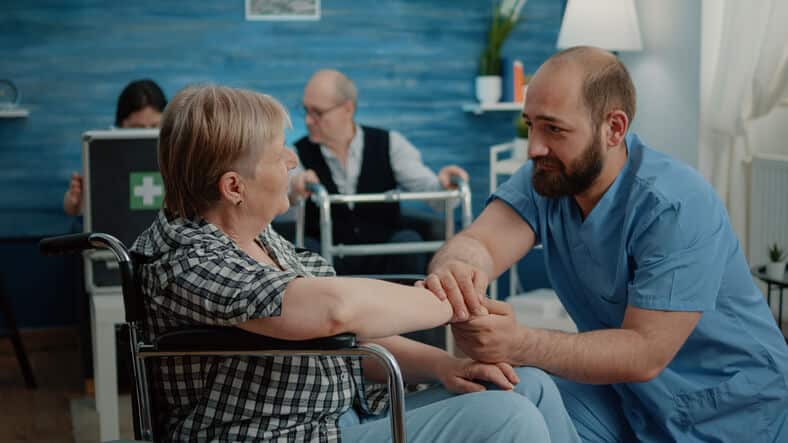Through training at AAPS, students in the Personal Support Worker Certificate program develop practical strategies to remain calm under pressure, communicate with empathy, and ensure safety in care environments.
Working in long-term care means supporting residents not just physically, but emotionally. Moments of frustration, confusion, or fear can escalate quickly, especially among residents living with dementia, chronic pain, or anxiety. That’s where strong communication and de-escalation skills become essential tools for every Personal Support Worker (PSW).
These are the same skills that transform a caring attitude into professional confidence.
Understanding De-escalation in Long-Term Care
De-escalation in long-term care is the process of calming tense or potentially aggressive situations before they become unsafe. It’s about recognizing early warning signs, such as raised voices, restlessness, or emotional withdrawal, and responding with patience and clarity.
For PSWs, de-escalation isn’t only about managing behavior. Successful de-escalation comes from understanding that emotions drive behavior.
Key Principles of Effective PSW Communication
1. Maintain a Calm Presence
Residents often mirror the emotions of those around them. A calm, composed demeanor helps lower tension. Keep your voice steady and low, use relaxed gestures, and avoid sudden movements that might startle or frustrate someone in distress.

Our PSW program in Ontario prepares students for the realities of care work.
2. Listen Before Responding
Active listening shows respect and helps identify the root of a resident’s concern. Use gentle prompts like “I understand this is upsetting” or “Can you tell me what’s bothering you?” These phrases validate emotion while keeping the focus on problem-solving.
3. Choose Words That Reassure
Simple, clear communication is often most effective. Avoid medical jargon or complex instructions. Phrases like “You’re safe here,” “Let’s take a breath together,” or “I’m here to help you” signal empathy and build trust.
4. Watch Your Body Language
Non-verbal cues matter as much as words. Maintain an open posture, keep your hands visible, and respect personal space. A soft smile, gentle nod, or eye contact at the resident’s level communicates safety and reassurance.
5. Know When to Step Back
Sometimes, the safest approach is to give a resident space and time to calm down. Step back physically while maintaining a supportive presence. If a situation continues to escalate, follow facility protocols for safety in resident care, including alerting your supervisor or security staff when necessary.

Students in AAPS’ personal support worker certificate program practice calming techniques.
Applying Calming Techniques in Caregiving
Students in AAPS’ personal support worker certificate program have the opportunity to practice calming techniques in caregiving through their clinical placement. For instance, when assisting a resident refusing medication, a PSW might:
- Pause and assess the tone and body language of the resident.
- Speak gently and provide choices, such as “Would you like to take this now or after lunch?”
- Use touch only if appropriate and welcomed, such as a light hand on the shoulder.
- Redirect focus by mentioning something comforting: like an activity or favorite topic.
These small actions can prevent confrontation and create a sense of control for the resident.
In another common scenario, such as when families express anger or frustration, PSWs learn to de-escalate by maintaining professionalism, validating feelings, and focusing on shared goals: ensuring the resident’s well-being.
The Role of Empathy in Conflict Resolution
In conflict resolution in care settings, empathy is a PSW’s strongest tool. By staying grounded and kind, PSWs can resolve conflicts while preserving relationships and trust.
Empathy also strengthens collaboration among healthcare teams. When PSWs communicate with nurses and administrators using clarity and respect, the entire care environment becomes safer and more supportive for residents.

Our PSW program in Ontario emphasizes the development of communication and collaboration skills.
Prepare for Your Career with Our Professional Personal Support Worker Certificate Program
Our PSW program in Ontario prepares students for the realities of care work with practical communication training and emotional intelligence development.
By mastering de-escalation and communication skills, PSWs ensure that every interaction reflects compassion, professionalism, and safety. These are the qualities that define excellent care, and they start with the right training.
Would you like to explore our personal support worker courses?
Contact AAPS for more information.




